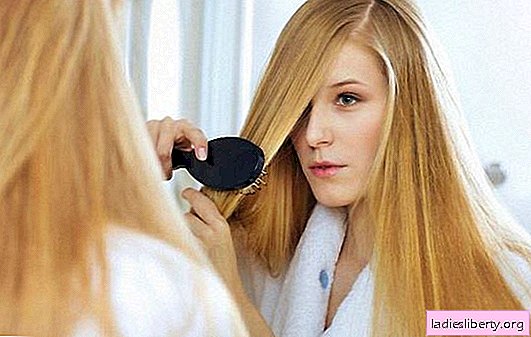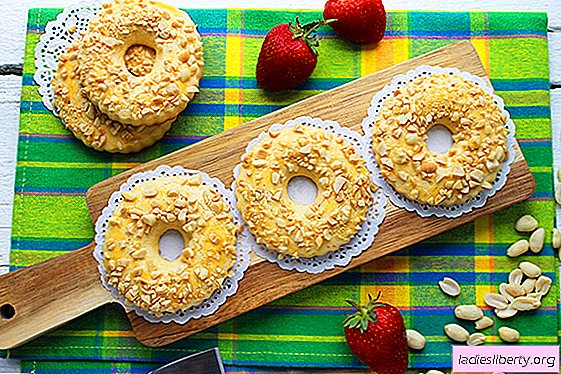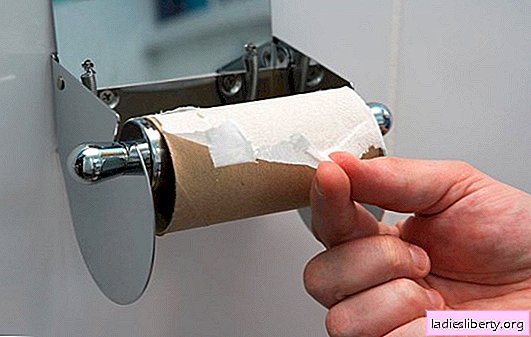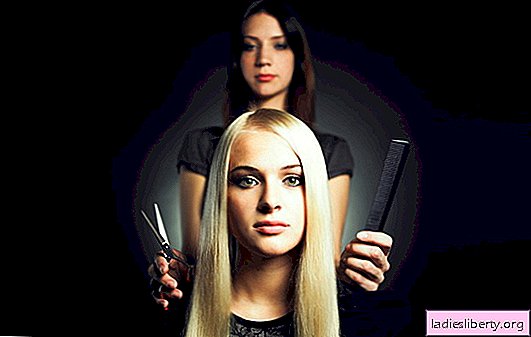
After the birth of a child, many mothers have a number of problems: strands are thinning, nails become brittle, problems with dental health appear, etc. In particular, mothers are concerned with the issue of increased hair loss after childbirth, the causes of the beginning baldness and ways to solve the problem.
First of all, it should be noted that this phenomenon is completely normal among women in the postpartum period. However, there are signs by which it can be determined that the cause of baldness is not at all in the birth itself. What are these symptoms and how to find out where the pathology is and where is the norm?
How to prevent the loss of curls and restore their lost health? Read the article.
Hair falls out after childbirth - reasons
Every day, the scalp of a person's head is updated. There is a loss of mature hair in the amount of 60-100 pieces (depending on the structure of the hairs and their type) and the growth of new hairs.
During pregnancy, due to an excessive level of estrogen in the body of a woman, delayed hair loss occurs, the life cycle of one hair is lengthened. Hair follicles get extra energy and become active. This gives a healthy shine and a thicker hair than 30% before pregnancy.
After childbirth, the picture changes. A natural change in the hormonal background causes delayed mature hair to leave its place of residence. And the growth of new hairs does not occur as fast as the loss of old ones. As a result, the effect of baldness is created.
Postpartum hair loss, or, as doctors say, telogen alopecia occurs from one and a half to five months after the birth of a little man. 6-15 months after the loss of individual strands, new hairs begin to grow. Full restoration of the hair structure occurs within a year after the loss of the first hair.
So most women have nothing to worry about. Hair loss at this stage is a natural process and you should not be afraid of it.
Hair falls out after childbirth: the reason is hormonal imbalance
A sign of hormonal adjustment after childbirth is that only a slight thinning of the scalp occurs. But if the hair disappears in large tufts, the loss is localized in one place, while a bald spot appears, the cause may be the effect of male hormones on the cells of the hair follicles.
Androgenic hair loss is a lesion in which the strands disappear in front and along the parting line. It is most often accompanied by oily seborrhea, pustular rash and increased facial hair growth. It occurs from polycystic ovary and other problems with the production of female hormones in the body. This phenomenon requires the use of drugs, hormone replacement therapy, which can only be prescribed by a doctor.
Thyroid diseases (thyrotoxicosis, endemic and diffuse goiter, etc.) are also the cause of increased hair loss after childbirth. They are accompanied by increased sweating, weakness, frequent mood swings, decreased memory, etc.
Common symptoms of thyroid disease are:
curls have lost color;
the hair structure becomes thinner;
hair loss throughout the body;
split and brittle hair;
natural curls straightened on their own.
Treatment of this kind requires careful observance of the prescriptions of the endocrinologist and trichologist.
Hair falls out after childbirth: causes - malnutrition and stress
Malnutrition of a nursing woman often becomes a source of problems with hair.
A lack of calcium, zinc, folic acid and iron leads to the above symptoms.
All these elements are in those products that often a nursing woman limits in her diet for one of the reasons:
Chronic and acute diseases of the mother (pyelonephritis, diabetes and more);
Allergic diseases of the child (diathesis, individual intolerance to certain substances);
Digestive problems of the baby (colic, etc.);
Overweight mothers (more than 27-30 BMI of individual muscle mass).
The source of hair problems can be experienced stress during childbirth. This is especially true for women who have undergone a caesarean section.
During childbirth, all the forces of the body are involved, a powerful release of adrenaline into the blood occurs. This leads to various consequences: from hair loss and brittle nails to disrupt the normal functioning of the digestive system.
Chronic lack of sleep and overwork also negatively affect the state of hair. These factors most often arise due to the inability to shift part of their responsibilities to others. As a result, a woman pulls the burden of family responsibilities alone, without support. The solution will be a little rest and home help from the household.
Hair falls out after childbirth: what to do - doctor's advice
In case of baldness, which lasts more than a year, it is imperative to contact a trichologist. The doctor will prescribe a number of tests and examinations that will show the level of certain substances in the blood and the state of the thyroid gland.
Depending on the results of laboratory tests and assessment of the structure of the hairs, one or another treatment will be prescribed.
A trichologist can prescribe a course of injections of biotin - vitamin B7. They will help restore a healthy shine of curls and strands, prevent loss.
In addition to injections, various vitamin and mineral complexes for lactating women can help. For example, Elevit Prenatal or Vitrum Prenatal Forte. They restore the lost balance of minerals in the body.
With iron deficiency anemia, iron-containing drugs are prescribed (Sorbifer, Ferrumpleks, etc.)
For diseases of the thyroid gland, a course of amino acids (lysine, arginine), vitamin B6, green tea and evening primrose oil is prescribed.
Hair falls out after childbirth: what to do - cosmetologist's recommendations
Specialists recommend mesotherapy - enrichment of strands with vitamins through a range of cosmetic procedures for hair care.
Mesotherapy is a therapeutic cocktail of vitamins injected deep under the skin. After a series of such injections (8-10 sessions), the hairline is gradually restored.
A daily head massage also helps. It stimulates blood circulation in the vessels of the brain, improving root nutrition.
Hair falls out after childbirth: what to do - folk remedies
Along with traditional methods of solving the problems of increased hair loss after childbirth, no less effective folk recipes will tell you what to do. Of these, the most effective are:
Egg and oil masks;
Rinse with a decoction of burdock;
Pepper tincture.
Of the egg components, the yolk has good properties. It is used to wash your hair no more than once a week.
Oils are used linseed, burdock and others. Oil wraps enrich the root structure with tocopherol, restoring shine and radiance to the hair. Apply oil masks for 2 hours, at least.
Rinsing the hair with a decoction of burdock roots enriches the hair follicles with natural vitamins. For cooking, burdock roots are brought to a boil over low heat. For 1 cup of hot water use 4 tbsp. l plants. Rub this product into the scalp every two days.
Pepper tincture - a popular alternative medicine, activates the blood circulation of the head. It is prepared quite simply: 6-7 hot peppers are poured into 0.5 liters of medical alcohol or vodka. Insist a week, occasionally shaking the contents.
Rub tincture into the hair roots with gentle movements and leave for a quarter of an hour. Wash off with warm water. Apply every week for a month.
Hair falls out after childbirth - hair care features
With increased hair loss after childbirth, what to do during treatment and how to care for hair will help the following rules:
Wash your head with clean filtered or settled water from the tap;
Use various decoctions of herbs, shampoos that strengthen curls, as well as conditioner rinses;
Comb with soft non-metallic brushes made of natural or artificial bristles;
Do not use a hair dryer, it mercilessly dries the locks.
Cover your head from the sun.
These simple tips will help keep your hair healthy and beautiful.
As it turned out, hair loss is a fairly common occurrence among women in the postpartum period, but is optional.
It is a signal of what is going wrong in the body of a woman. Therefore, you should carefully listen to yourself. Go to the doctor as soon as possible, use traditional and folk remedies for hair and take care of it carefully.
Keep your hair healthy and they will delight you with their shine and radiance!











